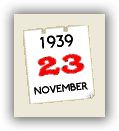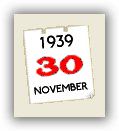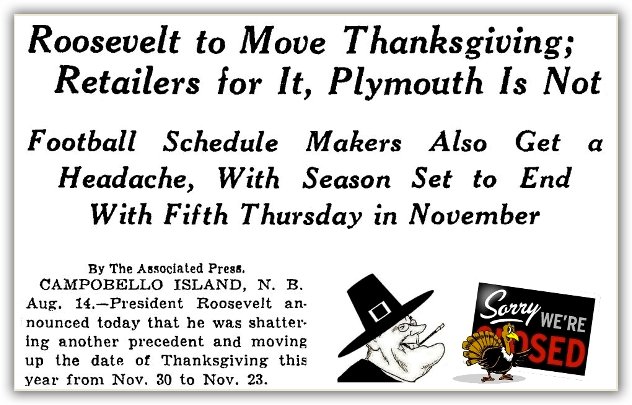






On Thanksgiving Day, November 23, 1939, Franklin Roosevelt carved the turkey at the annual Thanksgiving Dinner at Warm Springs, Georgia, and wished all Americans across the country a Happy Thanksgiving. Unfortunately, his greeting went unanswered in some states; many Americans were not observing Thanksgiving on the same day as the President. Instead, they were waiting to carve their turkeys on the following Thursday because November 30th in many states was the official Thanksgiving Day. Two Thanksgivings? Why were Americans celebrating a national holiday on two different days?
At the beginning of Franklin Roosevelt's presidency, Thanksgiving was not a fixed holiday; it was up to the President to issue a Thanksgiving Proclamation to announce what date the holiday would fall on. However, Thanksgiving was always the last Thursday in November because that was the day President Abraham Lincoln observed the holiday when he declared Thanksgiving a national holiday in 1863. Franklin Roosevelt continued that tradition, but he soon found that tradition was difficult to keep in extreme circumstances such as the Great Depression. His first Thanksgiving in office, 1933, fell on November 30th, the last day of the month, because November had five Thursdays that year. Since statistics showed that most people did not do their Christmas shopping until after Thanksgiving, business leaders feared they would lose money, especially during the Depression, because there were only 24 shopping days between Thanksgiving and Christmas. They asked Franklin Roosevelt to make Thanksgiving one week earlier. President Roosevelt ignored those concerns in 1933, but when Thanksgiving once again threatened to fall on the last day of November in 1939, FDR reconsidered the request and moved the date of Thanksgiving up one week. Thanksgiving 1939 would be held, President Roosevelt proclaimed, on November 23rd and not November 30th.
Changing the date of Thanksgiving seemed harmless enough, but in actuality proved quite controversial. It was so upsetting that thousands of letters poured into the White House once President Roosevelt announced the date change. Some retailers were pleased because they hoped the extra week of Christmas shopping would increase profits, but smaller businesses complained they would lose business to larger stores. Other companies that depended on Thanksgiving as the last Thursday of November lost money; calendar makers were the worst hit because they printed calendars years in advance and FDR made their calendars out of date for the next two years. Schools were also disrupted by Roosevelt's decision; most schools had already scheduled vacations and annual Thanksgiving Day football games by the time they learned of Thanksgiving's new date and had to decide whether or not to reschedule everything. Moreover, many Americans were angry that Roosevelt tried to alter such a long-standing tradition and American values just to help businesses make more money.*
As opposition grew, some states took matters into their own hands and defied the Presidential Proclamation. Some governors declared November 30th as Thanksgiving. And so, depending upon where one lived, Thanksgiving was celebrated on the 23rd and the 30th. This was worse than changing the date in the first place because families that lived in states such as New York did not have the same day off as family members in states such as Connecticut! Family and friends were unable to celebrate the holiday together.
Franklin Roosevelt observed Thanksgiving on the second to last Thursday of November for two more years, but the amount of public outrage prompted Congress to pass a law on December 26, 1941, ensuring that all Americans would celebrate a unified Thanksgiving on the fourth Thursday of November every year.
*Many
Americans at the time believed that the Pilgrims chose the last Thursday in
November to be Thanksgiving, but that is not the case. Although Americans
had celebrated days of thanksgiving before, it was not until 1863 when
President Lincoln began the observance of Thanksgiving in November.

 Please read our Legal Notice and our Privacy Statement.
Please read our Legal Notice and our Privacy Statement.